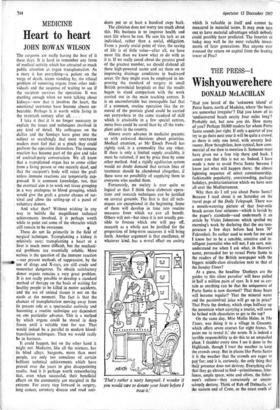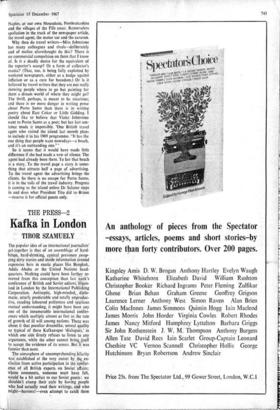Wish you were here
THE PRESS-1 DONALD McLACHLAN
- Had you heard of the 'unknown island' of 1'orto Santo, north of Madeira, where 'the boats are somewhat irregular'? Did you know of its `undiscovered beach nearly four miles long'? Probably not, but now you do. How many of you? Perhaps 50,000 readers for whom Porto Santo sounds just right. If only a quarter of you try to go there next year it will be quite a crowd, as there is only one hotel, with seventy bed- rooms. How thoughtless, how cynical, how com- mercial of me then to mention it, Someone must have given me a free trip there and back. I assure you that this is not so. Indeed, I have made a note to avoid Porto Santo because I know just what will happen there: the almost lightning sequence of select connoisseurship, fashionable popularity, overcrowding, package holidays, proletarianisation which-we have seen all over the Mediterranean.
Why then do I tell you about Porto Santo? Because I read about it on Saturday on the travel page of the Daily Telegraph. There was a mouth-watering picture of that four-mile beach across four columns—which is lavish by the paper's standards—and underneath it an article by Violet Johnstone which spoiled my morning's work by declaring that the sea-tem- perature a few days before had been 70° Fahrenheit. Its author used to work for me and I know her to be a sensible, sensitive and in- telligent journalist who will not, I am sure, mis- understand me when I ask what, in Heaven's name, persuaded her to reveal Porto Santo to the readers of the British newspaper with the biggest middle-class circulation next to that of the Sunday Times?
At a guess, the headline 'Donkeys are the guides to this silent paradise' will have pulled in half a million pairs of eyes. Is it not as cer- tain as anything can be that the uniqueness of Porto Santo is now doomed? That those boats will become regular? That the mineral water and the passionfruit juice will go up in price? That Preta the donkey, which stops halfway up the mountain when carrying a tourist, will soon be bribed with chocolates to get to the top?
On the same day, Miss Mollie Hales, in The Thries, was doing it to a village in Gascony, which offers seven courses for eight francs. 'It pains me to reveal it,' she wrote. It is indeed a terrible responsibility to do this to an unspoiled place. I shudder every time I see it done to the Highlands, though I trust the weather to keep the, crowds away. But in places like Porto Santo it is the weather that the crowds are eager to pay'for; and it is, curiously, the only thing that their presence does not destroy. Everything else that they go abroad to find—primitiveness, lone- liness, ample space, wine and olives, the fisher- men's culture—they consciously or uncon- sciously destroy. Think of Rab off Dalmatia, or the eastern end of Crete, or the coast south of
Naples, or our own Mousehole, Pembrokeshire and the villages of the Fife coast. Remorseless spoliation in the track of the newspaper article, the travel agent, the motor car and the caravan.
Why then do travel writers—Miss Johnstone has many colleagues and rivals—deliberately and of malice aforethought do this? There is no commercial compulsion on them that I know of. Is it a deadly desire for the equivalent of the reporter's scoop? Or a form of collector's mania? (That, too, is being fully exploited by weekend newspapers, either as a hedge against inflation or as .a cure for boredom.) Or is it believed by travel writers that they are not really showing people where to go but painting for them a dream world of where they might go? The thrill, perhaps, is meant to be vicarious; and there is no more danger in writing prose about Porto Santo than there is in writing poetry about East Coker or Little Gidding. I should like to believe that Violet Johnstone went to Porto Santo as a poet; but her last sen- tence made it impossible. 'One British travel agent who visited the island last month plans to include it in his 1969 programme. "It has the one thing that people want nowadays—a beach, and it's an outstanding one."' So it seems that it would have made little difference if she had made a vow of silence. The agent had already been there. To her that beach is a story. To the travel page a story is some- thing that attracts half a page of advertising. To the travel agent the advertising brings the clients. So there is no escape for Porto Santo; it is in the toils of the travel industry. Progress is coming to the island unless Dr Salazar steps in and does what President Tito did to Brioni —reserve it for official guests only.



































 Previous page
Previous page